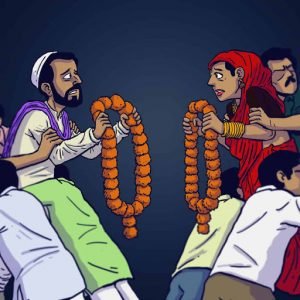Marriage An Arranged Affair
In India, marriage is considered as the most important event in a family. Since the day a child is born, parents start saving up for their child’s dream wedding. Arrange marriages are very common in India. Here, marriage is not a union of two people but of two families and a couple’s love is not enough to get a nod from their respective families. In an ideal scenario of an arranged marriage it’s not important for the couple to be birds of feather but what’s important is that they must belong to the same caste and religion. Marriages within the same caste and religions are the norms of Indian society, this norm has become a ball and chain for people who wish to marry outside of their religion, they often have to face the wrath of the society and this is why interfaith marriage is a path less traveled. Very few people dare to break these social norms, by marrying outside of their caste or religion and for such people The Special Marriage Act, 1954 was introduced.
Special Marriage Act, 1954
The Special Marriage Act, 1954 replaced the old Act III, 1872. The new enactment had three major objectives which were, to provide a special form of marriage in certain cases, to provide for the registration of certain marriages and, to provide for divorce. This act is applicable on any person, irrespective of religion. Inter-religion marriages are performed under this Act. Hindus, Muslims, Buddhists, Jains, Sikhs, Christians, Parsis, or Jews can also perform marriage under the Special Marriage Act, 1954.

Systematic Bias
There are a few major differences between a marriage under special marriages act and a marriage under Personal Laws. The first one is that even though Interfaith couples in India can marry under the 1954 act, which does not require them to convert to the same faith it obliges them to give one-months’ notice – Under this, applications are usually accepted at the Sub-Divisional Magistrate’s (SDM) office, or with a marriage officer located in the district where one of the individuals reside. After checking the application, a notice is sent to the couple’s permanent address, along with being displayed at the SDM’s notice board and during this time objections to the union are invited by the marriage registrar. Anyone who sees this notice can raise an objection to the marriage.
In India, there are a lot of hurdles for an Interfaith couple. There’s a huge parental resistance, extreme social ostracism, risk of harassment from vigilante groups. Incidences of honor killings are of no rarity in India and because of these reasons putting out a notice, inviting objections, and sending it to the couple’s parents creates a risk for the safety of the couple. In this notice all the major details like name, address, occupation, etc. of the couple are mentioned which makes it harder for the couple to get married privately and avoid resistance from society and this also violates the Right to Privacy. This is not a condition for marriage under personal laws and this is why this act is discriminatory in nature.
The second one is the difference in the number of witnesses. The Special Marriage Act requires an extra witness – three, instead of two in the case of marriage registration under personal laws. This makes the process of inter-faith couples marriage more complicated and harder.
Apart from these reasons, there’s also a lack of cooperation from the officials. In many cases, it’s been observed that the officials themselves have a prejudice against inter-faith marriages and thus they try to persuade the couple to not marry one another and create a hindrance in the process. Due to these reasons, many couples convert to another faith to register quickly under say Hindu or Muslim marriage acts.
Need For Reforms
India is in dire straits when it comes to religious harmony. At a time when interfaith relations and harmony must be promoted we see the complete opposite happening. From Love Jihad hysteria to the biasness in acts like special marriages 1954, the social interaction between different faiths in being discouraged. Loving and marrying someone is a personal choice and as mentioned in the Indian Constitution under the right to freedom and choice every adult has the right to choose their partner and make their own life choices. Similarly, the Indian constitution also guarantees the right to equality to all the citizens but this act is not serving this purpose either. Thus, to not compromise individual’s rights and freedom these biased acts must be reformed to make them more equal and accessible for everyone.
